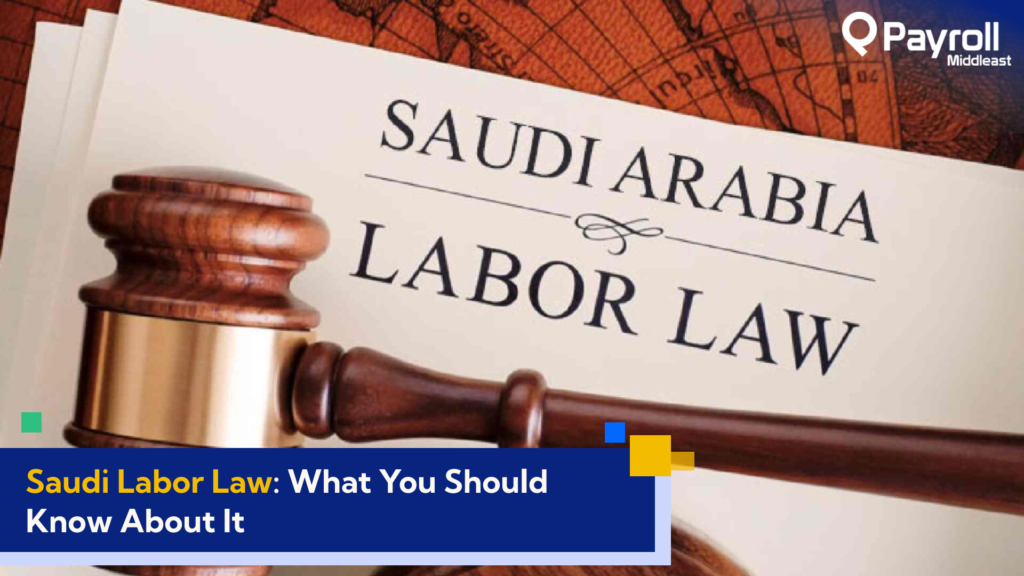Saudi Labor Law is reforms in 2025. Understanding the Saudi Labor Law is vital for employers and employees. Companies are categorized by size with varying fines for violations. Employers must follow a six-step guide for compliance. As Saudi Arabia progresses towards an inclusive labor market, staying informed about the latest labor law developments is crucial for all stakeholders to ensure a fair work environment and employee rights.
In this article we provide an overview of the key aspects of the Saudi Labor Law 2025. Recent modernizations align with Vision 2030, promoting equality and autonomy. Amendments by the Ministry of Human Resources focus on worker protections and compliance.
What is the Purpose of Saudi labor Law?
The framework of the Saudi Labor Law is intricately designed to elevate the competencies of Saudi workers through a diverse array of training programs. Encompassing technical acumen and vocational proficiency.
Furthermore, its overarching objective is to elevate the caliber of training within the private sector. Fostering a culture of continuous improvement in employee efficacy while meticulously upholding meticulous record-keeping standards.
These concerted endeavors form an integral part of expansive strategic endeavors aimed at catalyzing investment inflows into the vibrant landscape of Saudi Arabia. Concurrently fostering an all-encompassing work milieu that caters to the needs of both indigenous Saudi workforce and expatriate labor.
Noteworthy within this legislative tapestry is the imposition of fines for transgressions. Serving as a robust mechanism to ensure unwavering compliance and foster a culture of accountability among employers.
Core Principles of the Saudi Labor Law
The fabric of the Saudi Labor Law is woven with a myriad of core principles that intricately govern the complex tapestry of employer-employee relationships. Also, intricately regulate the dynamic labor market within the Kingdom of Saudi Arabia.
These foundational tenets encompass a diverse array of key facets meticulously delineated in various authoritative sources:
Fair Treatment and Non-Discrimination
- The core principles enshrined within the Saudi Labor Law highlight the critical significance of ensuring fair and unbiased treatment while eradicating discriminatory behaviors. These foundational ideals not only strive to establish equality between men and women concerning rights, obligations, pay, and retirement qualifications.
- But also, staunchly condemn any partiality based on gender, disability, age, or any other distinguishing characteristic during the recruitment and employment phases.
Saudi Arabia’s active support of international labor pacts advocating for parity and non-discrimination further. Underscores its unwavering dedication to championing these principles.
- Moreover, the legislation mandates impartiality for all individuals regardless of their faith, cultural heritage, gender orientation, or nationality. Employers are compelled to groom Saudi nationals to replace non-Saudi employees and meticulously document such transitions.
Protection of Employee Rights
- The intricate web of the Saudi Labor Law, as delineated in the common labour law, intertwines with the complex implementing regulations. Also, resolutions emanating from the ministry of labour website.
- This comprehensive legal framework not only serves as a bastion of equitable treatment but also stands as a bulwark safeguarding the rights of employees. It dictates unwavering impartiality for all individuals, transcending gender, disability, age.
Or any other discriminatory criterion throughout the intricate tapestry of recruitment and employment processes.
- Employers find themselves bound by obligation to meticulously groom Saudi law nationals for the eventual succession of non-Saudi workers. Meticulously documenting these intricate transitions.
- Furthermore, the meticulous crafting of written employment contracts becomes paramount, detailing intricate facets. Such as salary structures, benefits packages, and probationary periods.
- The overarching objective woven into the fabric of this labor framework is to cultivate a nurturing work environment. That not only nurtures productivity but also zealously upholds the intrinsic rights of both employees and employers alike.
Balance of Power, Compliance with Sharia Law
The core principles of the Saudi Labor Law revolve around a balance of power and compliance with Sharia Law. The Labor Law in Saudi Arabia is based on Sharia principles. It emphasizes good faith, abuse of right, and unjust enrichment. It ensures that employers comply with statutory provisions, guaranteeing fair treatment for workmen and protecting their rights.
The law mandates that Saudi nationals have the right to work without discrimination and outlines conditions for the employment of foreigners. It emphasizes the need for vocational preparation of Saudi workmen to replace non-Saudis.
Additionally, the Saudi labor law for employer focuses on protecting employees’ wages. It establishes new rules in Saudi Arabia today to safeguard workers’ financial rights, highlighting the significance of wages in employment agreements.
The law aims to enhance the private sector working environment by analyzing payment programs and advocating for reforms where necessary.
Moreover, the Basic Law of Governance in Saudi Arabia emphasizes the state’s commitment to patronize sciences, education, culture, public health, and environmental protection while upholding Islamic principles and values.
It outlines fundamental principles governing governance, societal values, economic policies, rights and duties, state authorities, financial affairs, and audit institutions within the Kingdom. The Basic Law underscores the Kingdom’s identity as a sovereign Arab Islamic State governed by Islamic principles and Arabic language.
Importance of Written Contracts
Within the intricate tapestry of Saudi Arabian labor regulations, a stringent mandate unequivocally prescribes that employment contracts must be meticulously transcribed in written form.
- These contractual compacts serve as the cornerstone of employer-employee relationships, meticulously outlining crucial details encompassing the identities of the parties involved.
- Intricate remuneration structures, delineation of job responsibilities, specified work locales, contract durations, entitlements to leaves, provision of fringe benefits. Stipulated grounds for termination, adherence to relevant legal frameworks, and an excess of other salient provisions.
- Moreover, ensconced within the labyrinthine framework of the Labor Law lies a provision delineating a probationary period extending up to 90 days for freshly onboarded employees.
- Furthermore, it is incumbent upon employers in Saudi Arabia to meticulously craft and prominently display comprehensive work regulations. Within the workplace, meticulously articulated in Arabic.
- A deep dive into the nuances of contract formation under Saudi legal jurisprudence unveils pivotal principles such as mutual assent, dynamic interplay between offer and acceptance. Exchange of consideration, prerequisites concerning contractual capacity, and unequivocal delineation of subject matter.
- Noteworthy is the legal validity accorded to oral agreements provided they meet exacting evidentiary standards. Furthermore, amendments to written contracts can be effectuated through actions or verbal communications between the contracting parties.
- In essence, written contracts emerge as indispensable instruments in ensuring crystalline clarity and unwavering adherence to the regulatory framework meticulously outlined within the Saudi Labor Law.
- These meticulously curated documents stand as stalwart guardians safeguarding the rights and obligations of both employers and employees with unparalleled efficacy.
See More: What is Mudad Payroll in Saudi Arabia?
Fair Dispute Resolution
Immersed within the intricate tapestry of the Saudi Labor Law, the pivotal role of fair dispute resolution mechanisms emerges as a cornerstone in ensuring equitable processes. For both employers and employees. Delve into the key facets of dispute resolution under the Saudi Labor Law:
Mediation:
- Embarking on the resolution journey, mediation stands as the inaugural stride. Fostering an environment where parties strive to attain an amicable settlement under the guidance of a neutral mediator.
- Furthermore, the ministry of labour Saudi Arabia frequently orchestrates mediation endeavors to untangle disputes sans the need for formal legal entanglements.
Arbitration:
- In scenarios where mediation falters, parties hold the option to transition to arbitration, where an arbitrator or panel issues a decisive ruling on the dispute.
- Additionally, arbitration mandates either a pre-existing arbitration agreement between parties or mutual consensus to arbitrate the dispute.
Litigation, Labor Courts:
- As a final recourse shrouded in gravity, parties can elevate their disputes to the specialized labor courts. Tailored to navigate employment-related conflicts, including those stemming from Article 81 terminations.
- Moreover, parties retain the prerogative to solicit legal representation in court, with the court’s pronouncements carrying binding and enforceable weight.
Legal Protections:
- Enshrined within the Saudi legal framework are robust safeguards ensuring both parties are endowed. With the right to a fair hearing and an avenue to articulate their case.
- Additionally, an appeal mechanism stands poised for dissatisfied parties, furnishing an additional stratum of legal scrutiny.
In essence, the labyrinthine dispute resolution mechanisms delineated within Article 81 of the Saudi Labor Law strive to furnish a just. Also, streamlined process for untangling conflicts intertwined with contract terminations.
These mechanisms stand as stalwart guardians protecting the rights of both employers and employees. Scoring a symphony of justice and fairness in alignment with entrenched legal precepts.
See More: How To Calculate End Of Service Benefits In KSA?
What does the Saudi labor law say about employment contracts?
The Saudi labor law stipulates that employment contracts must be in writing, following a template issued by the Ministry of Human Resource and Social Development.
These contracts should include details such as the employer’s name and address, employee’s information, Saudi Arabia labor salary law, duties, work location. Also, appointment date, contract length, leaves policy, benefits, termination events, governing law, and conduct rules.
Furthermore, employers are required to have work regulations in Arabic displayed at the workplace. Following HRSD’s standard form template and including health and safety provisions.
In addition to these requirements, only Saudi nationals can be employed under unlimited-term contracts in Saudi Arabia. The law emphasizes vocational preparation of Saudi workers to replace non-Saudis under specific conditions set by the Minister of Labor.
Moreover, the labor law also regulates the employment of foreigners, ensuring they meet certain conditions before working in the country. Also, emphasizing the rights of Saudi workmen to work without discrimination.
Benefits For employee in the labour law in Saudi Arabia?
Commencing with a burst of generosity, Muslim employees receive the boon of truncated workdays lasting six hours during the sacred month of Ramadan to harmonize with their spiritual practices.
Moreover, a tapestry of paid leaves adorns their employment journey, including the coveted annual leave that burgeons progressively based on service tenure, commencing at 21 calendar days for 1-5 years and blossoming to 30 calendar days for those exceeding 6 years.
Additionally, a festive array of approximately 10-12 paid holidays awaits employees to revel in during Saudi public holidays. Furthermore, a sanctuary of sick leave provisions beckons, offering respite for up to 30 days at full pay, 60 days at 75%, and an additional 30 days without pay annually, often under the watchful gaze of a medical certificate.
Paid Leave
In the realm of Saudi Arabian labor law, a realm where specific benefits are enshrined for employees, a realm that includes the coveted realm of paid leave, a tapestry of entitlements unfolds. Behold the key points that illuminate the essence of paid leave in this realm:
- Initially, as the sands of time shift, employees find themselves bestowed with annual leave, a treasure tied to their seniority. A treasure that bestows 21 days upon those with one to five years of service and 30 days upon the seasoned souls with more than five years of dedication.
- Furthermore, within the confines of twelve moons, this annual respite must be granted. Lest the scales tip and the company’s debt transform into a cascade of cash instead of leave.
- Moreover, like whispers in the desert wind, employees possess the power to carry over untaken leave to the next oasis of vacation. Guided by the written consent of their employer.
- Lastly, in a dance of negotiation and approval, employees may beckon ten additional days of unpaid leave per annum. Subject to the nod of approval from their employer.
Compensation and Benefits
Encompassing paid leave and compensation. Let us embark on a journey through the labyrinthine details that define these provisions:
- Behold, as the sands of time shift, employees find themselves graced with annual leave based on seniority. With 21 days for 1-5 years and 30 days for the venerable souls with 6+ years of service.
- Moreover, like whispers in the desert wind, employers often bestow additional benefits such as health insurance and stipends for child care and education.
- Furthermore, within the intricate web of regulations, compensation guidelines emerge. Including a minimum wage for public sector employees and provisions for overtime payment.
- Additionally, employees are adorned with entitlements to a myriad of leaves, sick leave, maternity leave, paternity leave, bereavement leave, and even Hajj leave.
- Lastly, amidst the vast expanse of Saudi Arabia’s social security system lies a treasure trove of benefits, medical care, childcare, pensions, unemployment support, housing assistance, and disability benefits.
See More: Minimum Wage In Saudi Arabia 2025
What do Saudi labor laws say about contract termination?
In the intricate tapestry of Saudi labor laws, a realm where regulations weave a cloak of fairness and protection for all parties involved in the enigmatic dance of contract termination, a symphony of key points emerges from the depths of legal intricacies:
- Termination of Indefinite-Term Contracts: Behold, as Article 75 of the Saudi Labor Law takes center stage. Guiding the termination of indefinite-term contracts with a delicate balance.
A written notice, akin to a parchment scroll of fate, must be unveiled at least 60 days prior for monthly-paid workers and 30 days for others. Allowing the dance of closure to unfold.
- Termination Without Compensation: Moreover, within the labyrinthine corridors of Article 80, nine reasons stand as pillars for termination without the golden threads of award or advance notice.
A mandate echoes through these halls, demanding employers grant workers a voice to raise objections before the final curtain falls.
- Fixed-Term Contracts: Furthermore, within the scrolls of Article 55 lies the definition of fixed-term contracts with their destined end dates. A renewal after this appointed hour may transform this contract into an indefinite tale woven with certain conditions.
How can Payroll Middle East help you?
As a top payroll service providers in Middle East, Payroll Middle East emerges as a beacon of expertise and reliability, a certified firm with a legacy dating back to 1985. Behold the myriad ways in which this esteemed entity can extend its hand to guide and support you:
- Streamlined Payroll Management: Like a skilled conductor orchestrating a symphony, Payroll Middle East harmonizes businesses’ payroll processes. Weaving a tapestry of automation and compliance to ensure seamless operations.
- Expert PRO Services: Moreover, navigating the labyrinthine landscape of PRO services, the firm unveils a treasure trove of offerings, from processing local residency statuses to analyzing recruitment freezes and aiding in workforce expansion.
- Payroll Outsourcing Solutions: Lastly, like a guiding star in the night sky, businesses can entrust their payroll functions to the adept hands at Payroll Middle East.
Conclusion
In a tapestry woven with the threads of progress and transformation, the Kingdom of Saudi Arabia has borne witness to profound shifts within its labor sector, notably in 2023. A symphony of change resonates, echoing a concerted effort to enrich the employment landscape and attract investments.
The recent amendments to the Saudi Labor Law orchestrated by the Ministry of Human Resources and Social Development stand as a testament. To a steadfast dedication to refining regulations and ensuring unwavering compliance.
These transformative revisions, replete with intricate details on violations and penalties for errant employers. Serve as pillars upholding the ideals of fairness, safeguarding workers’ rights, and illuminating a path towards a transparent labor market. Contact us to learn more.







Self-Appraisal Comments by Employee: Example